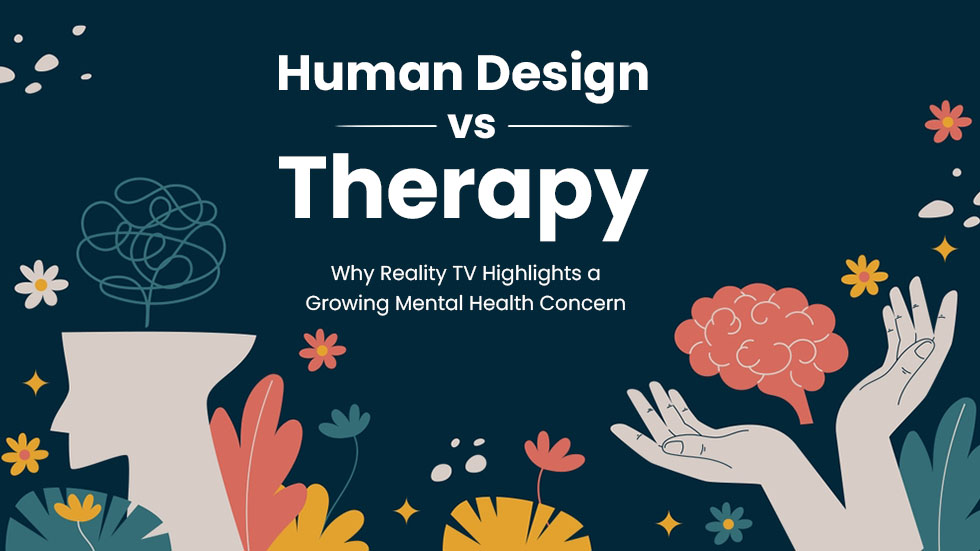Human Design vs. Therapy: A Growing Mental Health Concern
If you enjoy reality tv as much as I do, and your recently watched Love Is Blind UK, Season 2, you will be familiar with the phrase “Trust your spleen” Patrick Justus was the participate that shared his knowledge with the rest of the world about, “Human Design” and how this was not only the best way to find love, but to make most decisions in his daily life. He identifies as a Coach of Human Design, which means he will ask for your birthdate, administer a survey, and charge a fee so he can then guide you on how to make life decisions by listening to specific body parts.
Yes, this can be helpful for some by opening up dialogue about your strengths, decision-making style, and life purpose. For many, it feels exciting, empowering, and even spiritual. It offers a sense of identity and belonging, which explains why it’s appealing enough to make its way into mainstream through reality TV.
For some, it was a quirky detail about a career. However, for others, it highlighted a growing trend: people turning to human design and similar practices as an alternative to therapy
This raises an important question: what happens when self-discovery tools begin to replace professional mental health support?
Why People Are Choosing Human Design Over Therapy
Human design isn’t the only alternative people are seeking out. Life Coaching (by non-mental health professionals), Astrology, psychedelic-assisted therapy, and energy healing are all part of a larger cultural shift toward quick, accessible tools that feel less clinical than therapy.
The appeal is easy to understand:
It feels immediate – You walk away with a chart or framework right away.
It avoids stigma – They don’t carry the same associations as “mental illness.”
It’s personalized – Many promises a map of you and your unique strengths.
It’s empowering – The language is uplifting and focused on potential, not diagnosis.
But while these benefits may feel good, they can also create a false sense of security.
The Risks of Replacing Therapy
Here’s the concern: while human design and other alternative therapies can be a helpful tool for self-reflection, it cannot replace the evidence-based support of therapy.
Unaddressed mental health conditions: Anxiety, depression, trauma, or PTSD cannot be healed through charts or psychedelic trips alone.
Lack of clinical safeguards: Most of these professionals providing these alternative therapies are not trained to identify risk factors such as self-harm, suicidal ideation, or serious mental illness.
Misdirection: Believing that self-help frameworks are “enough” may delay or prevent someone from seeking the treatment they truly need.
Blame the Victim: Many of these alternative therapies have a way of making people believe that they are not doing the right thing, not following the prescribed actions or manifesting hard enough and that is why they aren’t getting better. When in actuality the root of the cause is not being addressed with a professional.
Why is it important to discuss this?
Seeing a Love Is Blind UK participant introduce themselves as a human design coach that relies on his Spleen to make decisions is more than just reality TV entertainment. It reflects a cultural moment where self-discovery frameworks are entering mainstream awareness—and people are gravitating toward them as alternatives to therapy.
As a mental health professional, this is both a challenge and an opportunity to remind people that therapy feels as accessible, empowering, and personalized as the alternatives they are seeking out. To give potential clients a better understanding of the work that is done in therapy and that not all therapy techniques are the same. While one client may benefit from Cognitive behavioral therapy, another may benefit more from EMDR (Eye Movement Desensitization and Reprocessing therapy).
Final Thoughts
Human design and other self-discovery tools can absolutely have value. They can spark curiosity, inspire growth, and encourage people to reflect on their lives. But when they are used as a replacement for therapy, they risk leaving deeper issues unresolved.
The lesson here isn’t to dismiss human design or other alternative therapies, but to include them with therapy that a licensed mental health therapist provides. Therapy can be hard work and won’t always feel that you are walking away with a pretty chart or roadmap on how to heal all your problems. But having a licensed therapist means you have someone who has dedicated their life, after years of education and experience help you walk through the journey of healing.
Looking for support that helps you go deeper than surface-level self-discovery? Contact us today to learn how therapy can help you grow with both insight and healing.


Recent Comments